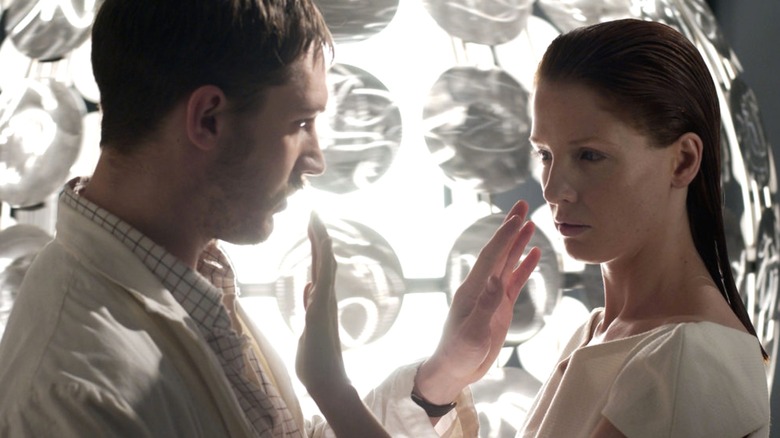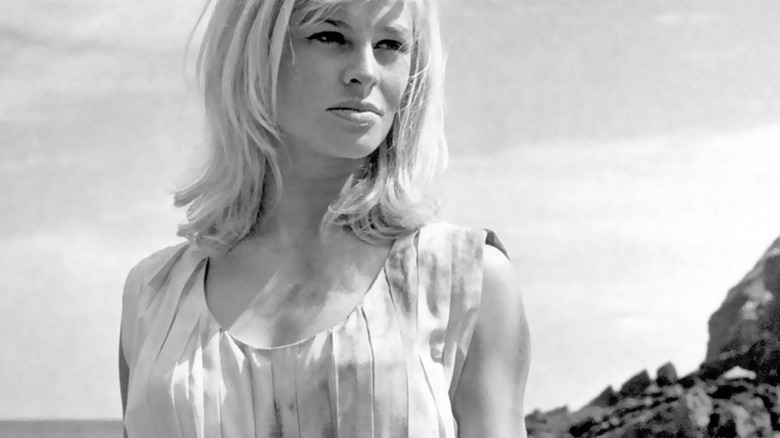Yellowstone's Kelly Reilly And Tom Hardy Starred In An Overlooked Sci-Fi Remake
This post contains spoilers for both the 1961 and 2006 versions of "A for Andromeda."
You might've heard of 2006's "A for Andromeda," which sees Tom Hardy (then only four years out from making an early impression in "Star Trek: Nemesis") and Kelly Reilly (herself similarly far away from exploding in fame thanks to "Yellowstone") playing its leads (along with a pitch-perfect Charlie Cox). It's understandable if you haven't, though, as this BBC Four telemovie (with a runtime of only 85 minutes!) didn't make any waves except for becoming the channel's top-rated program during the week it premiered in 2006. John Strickland's sci-fi thriller aims to explore the ethical concerns surrounding artificial intelligence and the weaponization of science for capitalistic profit, all while telling an unconventional love story. But it's also a remake of the 1961 TV series of the same name written by Fred Hoyle and John Elliot. But what kind of legacy has the original "A for Andromeda" left behind?
Well, Hoyle and Elliot's seven-part BBC sci-fi drama was nothing short of groundbreaking when it first aired, with its plot revolving around a supercomputer that helps create an entity both beautiful and terrifying. Now, this was way before evil supercomputers had become a recognized trope in mainstream science fiction. Indeed, Harlan Ellison didn't create the frighteningly sentient supercomputer AM until six years later in his critically acclaimed story, "I Have No Mouth, and I Must Scream." But while Ellison's AM is powerful enough to almost eradicate humanity, Andromeda's mere existence in Hoyle and Elliot's series gives new meaning to the definition of life and what it means to be human.
The 1961 "A for Andromeda" doesn't sugarcoat things or beat around the bush, either. It's a taut, well-written work that combines existential horror with fictional technology to raise an intriguing question: What would happen if humans had access to a line of code that could create a being who looks and feels organic but isn't human in the traditional sense? People's hardwired tendency to underestimate what it doesn't understand (while also clinging to their instinctual distrust of the unknown) spells doom in the end, and these themes elevate "A for Andromeda" into a brilliant entry in the hard sci-fi genre.
So, circling back to the Hardy and Reilly-led TV movie, how does this severely truncated re-telling of the story work in comparison to the original?
The 2006 A for Andromeda remake oversimplifies the original's profound themes
Strickland's "A for Andromeda" follows the story of the original series closely, focusing on a group of scientists who receive a radio signal — one from another galaxy — that contains instructions to build a supercomputer. Once this machine is finished, it provides the formula to create Andromeda (Reilly), an organic lifeform who will supposedly act as humanity's savior. However, one of the scientists, named John Fleming (Hardy), views Andromeda with suspicion, noting that her intentions remain as cryptic as they were on the day she was born. Indeed, Fleming comes to believe she could actually prove to be the cause of humanity's downfall instead of the catalyst for its advancement.
But while the meat of the story is the same, Strickland takes a vague, superficial approach to executing it. Because of this, the scientists appear to be working on something too complex for words, yet these illusions shatter the moment you decide to look closer.
Hoyle and Elliot's original series is far from perfect, as it abruptly backs out of deeper philosophical questions for the sake of plot convenience. But Strickland's version doesn't even attempt to dive deeper, as it tackles the themes of first contact and human-alien communication in the most gimmicky way imaginable. What's more, its shortened retelling of this story omits crucial context, leaving us more confused than intrigued about the central relationship that haunts the narrative.
For instance, we are never given the chance to understand why Fleming is so distrustful of the supercomputer (which he helped build enthusiastically) or what Andromeda's true intentions are. If we're meant to criticize Andromeda's claim of personhood, we are unable to do so as she isn't granted the interiority required for such moral dilemmas in the first place. The rest is a blur of technical jargon thrown around for the sake of it, coupled with uninspired special effects that do little to convince us about this seemingly futuristic world and the people who inhabit it.
In summation, 1961's "A for Andromeda" is clearly the superior version of the story. Unfortunately, it has been mostly lost to time, with only a single episode from the series currently available for our viewing pleasure.

